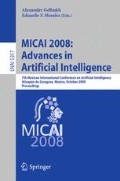Abstract
Laparoscopic surgery is a widely accepted operating technique which continues to spread into different areas of medicine. Because of it’s differences to open surgery (like limited perception) it demands a different training program than the traditional surgical training programs. Since it’s introduction in 1980’s several training curriculums for laparoscopic surgeons have been deployed and a set of skills that need to be mastered during the training has been defined. The training system proposed in this paper uses a knowledge base to guide the trainee trough the process of acquiring the necessary skills, based on the trainees measured performance in several areas. The system’s guidance allows for better understanding of areas that need additional work and for faster acquisition of those, without the need for extra attention from the tutoring staff.
Access this chapter
Tax calculation will be finalised at checkout
Purchases are for personal use only
Preview
Unable to display preview. Download preview PDF.
References
Hansen, J.B.: Laparoscopic versus Open Appendectomy: Prospective Randomized Trial. World Journal of Surgery 20(1), 17–21 (1996)
Wytyczak-Partyka, A., Nikodem, J., Klempous, R., Rozenblit, J.: A novel interaction method for laparoscopic surgery training. In: Proceedings of the 8th Annual IEEE International Conference and Workshops on Human Systems Interactions, pp. 858–861 (2008)
Kneebone, R.: Simulation in surgical training: educational issues and practical implications. Medical Education 37(3), 267–277 (2003)
Rosser Jr., J.C., Rosser, L.E., Savalgi, R.S.: Objective Evaluation of a Laparoscopic Surgical Skill Program for Residents and Senior Surgeons. Archives of surgery 133(6), 657–661 (1998)
Rosser, J.C., Murayama, M., Gabriel, N.H.: Minimally invasive surgical training solutions for the twenty-first century. Surgical Clinics of North America 80(5), 1607–1624 (2000)
Ren, J., Sheridan, T.: Expert system training and control based on the fuzzy relation matrix. Technical report (1991), http://ntrs.nasa.gov/archive/nasa/casi.ntrs.nasa.gov/19910016327_1991016327.pdf
Kandel, A.: Fuzzy Expert Systems. CRC Press, Boca Raton (1992)
Feng, C., Rozenblit, J.W., Hamilton, A.J.: A Hybrid View in a Laparoscopic Surgery Training System. In: Proceedings of the 14th Annual IEEE International Conference and Workshops on the Engineering of Computer-Based Systems, pp. 339–348 (2007)
Pollefeys, M., Van Gool, L., Vergauwen, M., Verbiest, F., Cornelis, K., Tops, J., Koch, R.: Visual Modeling with a Hand-Held Camera. International Journal of Computer Vision 59(3), 207–232 (2004)
Derossis, A.M., Fried, G.M., Abrahamowicz, M., Sigman, H.H., Barkun, J.S., Meakins, J.L.: Development of a model for training and evaluation of laparoscopic skills. Am. J. Surg. 175(6), 482–487 (1998)
Fried, G.M., Feldman, L.S., Vassiliou, M.C., Fraser, S.A., Stanbridge, D., Ghitulescu, G., Andrew, C.G.: Proving the Value of Simulation in Laparoscopic Surgery. Annals of Surgery 240(3), 518–528 (2004)
Zadeh, L.A.: Fuzzy sets. World Scientific Series In Advances In Fuzzy Systems, 394–432 (1996)
Scharstein, D., Szeliski, R.: A Taxonomy and Evaluation of Dense Two-Frame Stereo Correspondence Algorithms. International Journal of Computer Vision 47(1), 7–42 (2002)
Klaus, A., Sormann, M., Karner, K.: Segment-based stereo matching using belief propagation and a self-adapting dissimilarity measure. In: Proceedings of the 18th International Conference on Pattern Reconition, vol. 3, pp. 15–18 (2006)
Author information
Authors and Affiliations
Editor information
Editors and Affiliations
Rights and permissions
Copyright information
© 2008 Springer-Verlag Berlin Heidelberg
About this paper
Cite this paper
Wytyczak-Partyka, A., Nikodem, J., Klempous, R., Rozenblit, J., Feng, C. (2008). Computer-Guided Laparoscopic Training with Application of a Fuzzy Expert System. In: Gelbukh, A., Morales, E.F. (eds) MICAI 2008: Advances in Artificial Intelligence. MICAI 2008. Lecture Notes in Computer Science(), vol 5317. Springer, Berlin, Heidelberg. https://doi.org/10.1007/978-3-540-88636-5_91
Download citation
DOI: https://doi.org/10.1007/978-3-540-88636-5_91
Publisher Name: Springer, Berlin, Heidelberg
Print ISBN: 978-3-540-88635-8
Online ISBN: 978-3-540-88636-5
eBook Packages: Computer ScienceComputer Science (R0)

